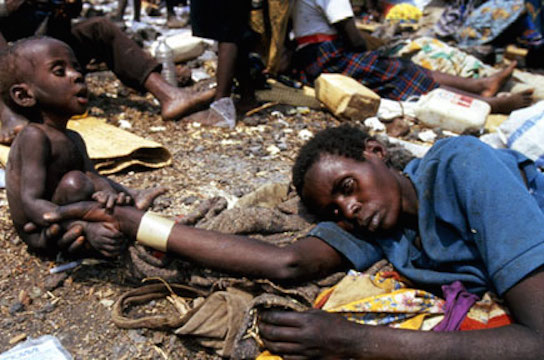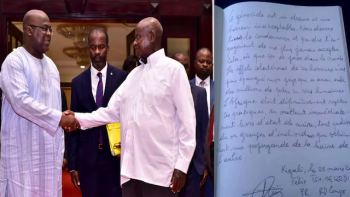Rwanda: Do not politicize Memories, Honor and Rebuilding
by AfroAmerica Network on April 28, 2013Do not politicize Memories, Honor and Rebuilding
by Felicien Kanyamibwa, PhD
Usually, around this time I write a piece on a topic dear to my heart. As I was thinking about the compelling thoughts I should share, I surprised myself: I found myself reading a speech by General Paul Kagame of Rwanda.
On April 7, 2013 he said in his speech: “In remembering, it is important that we comfort those who lost loved ones and were left orphans, widows and or without any family so that they are not overwhelmed by the immense sorrow. They need reassurance to give them the courage and hope to carry on.”
Yes, we have to remember, comfort, support and show our love to those who lost loved ones, were stolen their joy to live a full life and their sense of humanity by the worst criminals. We owe our compassion to our neighbors, friends and compatriots who have been living with sorrow. It is our duty as Rwandans, but most importantly, as human beings to console, reassure, and look after each other .
Yes, in spite of everything I stand for, I was intrigued by General Kagame’s speech. On first impression, I thought General Paul Kagame had made an impressive step forward from his past speeches that fueled the demons of discord among the Rwandan people. Unfortunately, I do not expect the speech to be genuine and General Kagame to match his actions to his words. Why? I have consistently and strongly disagreed with General Paul Kagame because through his speeches, policies, and actions, he led the Rwandan people to believe that, depending on their ethnic background, there are good orphans and widows, Tutsi, who have the right to be comforted and supported and bad orphans and widows, Hutu, who must be condemned, blamed, cast away and banned. The opening of his speech is a clear indication that his usual message of discord has not evolved. General Paul Kagame’s speeches have thrown around the neck of the Rwandan people the shackles of fear, division, and degeneracy.
Remember and Reunite, Do not Politicize.
The Rwandan tragedy was not selective. It did not spare people or families on the basis of tangible or intangible criteria, such as an ethnic background. The Rwandan tragedy has impacted all families, all backgrounds, and all ethnic groups. Hence, if we need to remember, to build memorials, and to teach our kids so that they teach their owns, our collective responsibility obliges us to treat each victim with honor and dignity. As I wrote in my May 19, 2009 pamphlet titled “Beyond Ethnic Politics and Fear: Hutu, Tutsi, and Ethnicity in Rwanda,” most Rwandan families are composed of people from all backgrounds, heritages and walks of life, killed by criminals from all heritages. When these families and their members remember and comfort one another, they need to embrace their diversity in the tragedy. The tragedy should not divide them. Instead, it should bring them together and continue to keep them even closer. They need to remember and support each other, Hutu, Tutsi and Twa; They do not need to politicize the tragedy. They should encourage faith in their destiny, hope in adversity, and love in carrying on and moving forward.
Power Without Virtue: The Antithesis of Glory
Rwandan Patriotic Front government, represented by General Paul Kagame or perhaps, General Paul Kagame at the helm of RPF has made and continue to make a serious mistake: one cannot build a regime on the sorrow of a portion of one’s people by blaming the other portion and turning lives into ashes. At some point, it will not work. This was true before 1959, in 1990, 1994, 1997, and more so today.
Even Machiavelli, known for being the undisputed master of realpolitics warned leaders, especially those who acquired power through crimes, against such an approach, in the following terms: “Yet one cannot call it virtue to kill one’s citizens, betray one’s friends, to be without faith, without mercy, without religion; these modes can enable one to acquire empire, but not glory.”
Michaevili continues further, using the example of the vicious Sicilian leader Agathocles, who “not through anyone’s support but through the ranks of the military, which he had gained for himself with a thousand hardships and dangers, he came to the principate and afterwards he maintained it with many spirited and dangerous politics… For, if one considers the virtue of Agathocles in entering into and escaping from dangers, and the greatness of his spirit in enduring and overcoming adversities, one does not see why he has to be judged inferior to any most excellent leader. Nonetheless, his savage cruelty and inhumanity, together with his infinite crimes, do not allow him to be celebrated among most excellent men. Thus one cannot attribute to fortune or virtue what he achieved without either.”
The theme set by the Rwandan Patriotic Government this April 2013 is Remember, Honor and Rebuild. A priori, it appears that there is an improvement in the choice of the theme compared to the themes of the past. However, the major issue is that the theme once again is not inclusive and is only by, of, and for one section of the people. Will there be a time when the theme will be to “Remember and Honor Every Victim, and Rebuild Together”?
Sharing a collective memory for all the lost loved ones and supporting all the widows and orphans, regardless of their ethnic background, will help us keep faith and hope alive so that we may rebuild the shattered lives and the country together in brotherhood and sisterhood, with love. This is the best way forward, the core foundation of the Rwandan nation we need to leave to the next generations.
Faith, Hope, and Love: It is Not Just Religion, It is Also Politics; It is Humanity.
Moving forward is like growing into a man or a woman from a child. It is both a physical and a spiritual journey. It is a journey of faith, hope and ultimately learning how to honor and love each other. Because, as Paul the Apostle told Corinthians:
“When I was a child, I talked like a child, I thought like a child, I reasoned like a child. When I became a man, I put the ways of childhood behind me. For now we see only a reflection as in a mirror; then we shall see face to face. Now I know in part; then I shall know fully, even as I am fully known. And now these three remain: faith, hope and love. But the greatest of these is love.”
So, Machiavelli the politician and Paul the Apostle converge onto this indelible truth: whether in politics, religion, or all day lives, leaders must strive to promote two principles to their people: faith in themselves and hope in the future. But nothing can be achieved without the third and most important component: love for the human kind, the people with whom one shares the journey forward.
As the Rwandan people carry on and rebuild, they should:
- not allow divisive politics affect the faith in ourselves, neighbor, and our country;
- rebuke politicians, neighbors, and others who encourage people to fear or mistrust each other just because of the diversity in their backgrounds;
- not let pain overcome the humanity: each one’s lost of the loved one is as precious as the neighbor’s;
Because, at the end, our faith in each other and the country, the hopes for a better tomorrow, and the sense of common purpose are the surest path to a better tomorrow for all and for the generations to follow.
Felicien Kanyamibwa, PhD
New Jersey, United States of America
April 26, 2013.
Rwanda: Do not politicize Memories, Honor and Rebuilding
Typography
- Smaller Small Medium Big Bigger
- Default Helvetica Segoe Georgia Times
- Reading Mode
Rwanda: Do not politicize Memories, Honor and Rebuilding

















